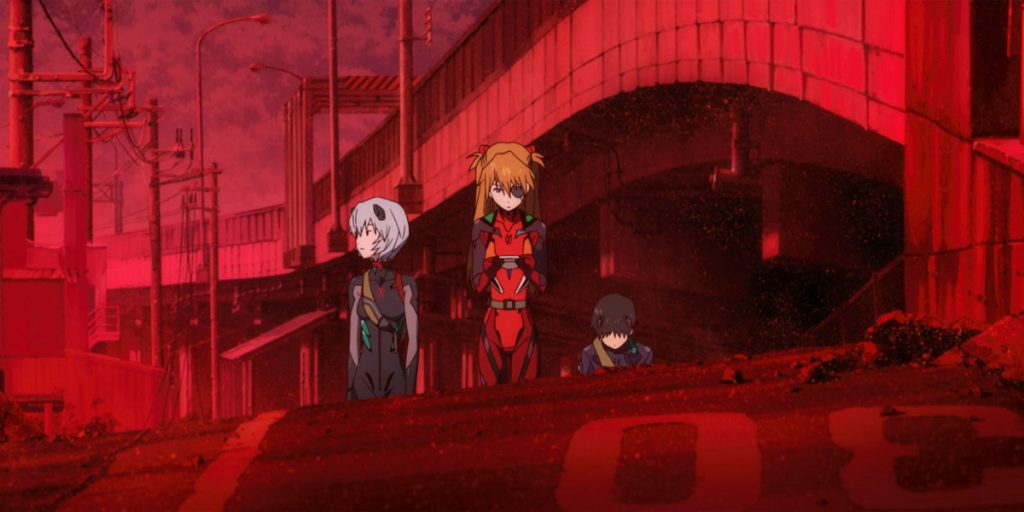Evangelion: 3.0+1.0 Thrice Upon a Time, directed by the visionary Hideaki Anno,is a thrilling and moving farewell to the Neon Genesis Evangelion universe.
Before I can begin unpacking Evangelion: 3.0+1.0 Thrice Upon a Time, let me start off with a brief history of its making, and a summary of where it finds its central characters. For those unfamiliar with Neon Genesis Evangelion, it was an acclaimed and influential anime from the 1990s, following a teenage boy, Shinji, as he pilots giant mechas in order to protect the world from Angels, humongous creatures who seemingly want to destroy humanity. The show ended in 1996 to mixed opinions from fans, though many were critical of the show’s deeply psychological and minimalist finale. A year later, The End of Evangelion was released, which provided a much more apocalyptic, action-packed, and grand finale to the series. Then, ten years later, Evangelion: 1.0 You Are (Not) Alone was released, beginning a tetralogy of films (dubbed Rebuilds) that reimagined the narrative arc of Neon Genesis Evangelion with the kind of massive scope and impressive animation a bigger budget could provide. Thrice Upon a Time finally concludes the fourteen year journey the Rebuild films have taken fans on, and is likely a farewell to Neon Genesis Evangelion in its entirety.
Thrice Upon a Time is the first film in the Rebuild series that feels like a seamless continuation of the previous entry. While Evangelion 3.0 You Can (Not) Redo contains an onslaught of bleak drama and devastating imagery, the first hour of Thrice Upon a Time takes a necessarily optimistic approach. We see our three central characters (Asuka, Rei, and Shinji) as they reconnect with old friends and set out on heart-wrenching journeys to discover their true selves. Among the beautiful scenery and with the aid of Toru Noguchi’s emotive score, the first act of Thrice Upon the Time is the best the Rebuild series has had to offer. It’s the first time in the series that hope has seemed possible, both for our heroes and for the world they live in.
However, while it would be easy for Shinji to stay here in this Eden of sorts, living out his days with people who care about him, he realizes that he must atone for his sins of blindly setting the apocalyptic events of the previous films in motion. He also sees that only he can stop his father from destroying all life from the world. These realizations set in motion the second act of the film, which is by far the weakest part of the film. It is filled with sci-fi jargon that introduces a bunch of new terms and ideas, and is the only moment during the two and a half hour runtime where the film starts to drag.

Fortunately, the final act provides an emotionally and aesthetically satisfying close to the film, and to the entirety of the Rebuilds. Director and Evangelion mastermind Hideaki Anno lets his imagination run wild in the last hour of Thrice Upon a Time, reveling in the destruction and utter breakdown of the reality of the world, as well as the reality of the film. The imagery is often gorgeous, cinematic, and immersive, even when indulging in computer-generated imagery that breaks the bonds of realism and aims towards something much more abstract. We witness characters fighting, but when they crash through buildings we realize they’re fighting on an empty film set. The way Anno blends meta elements into the finale of Thrice Upon a Time is visually interesting and captivating, reminiscent of his work on The End of Evangelion. A lot of Thrice’s finale feels like it’s borrowing from End of Evangelion, but Anno adds narrative and aesthetic twists that tread enough new ground to create an entirely new experience.
Ultimately, Thrice Upon a Time cannot help but feel superfluous. What was the point of spending fourteen years reimagining what was already a perfect television series? Could it be that the minds behind Neon Genesis Evangelion couldn’t help but to return to this world and its characters? It’s hard to tell what the point of these films are, but nevertheless, it is a joy to sit with familiar characters as they’re taken down different paths and react toward different experiences. And even when Anno is retreading familiar territory in Thrice Upon a Time, he is finding new angles from which to explore characters, new ideas to explore, and frequently coming to terms with his own artistic creation. It is a difficult film to explain without spoiling the entire thing, but Thrice Upon a Time is surely one of the strangest, invigorating, and life-affirming cinematic experiences of the year, flaws and all.
Evangelion: 3.0+1.0 Thrice Upon a Time is now available to watch on Prime Video.

